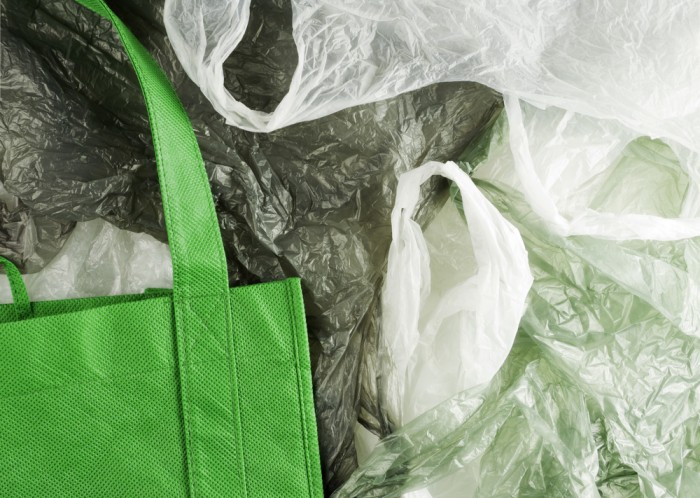We’ve all heard the admonitions against single-use plastic bags—those flimsy things we get at the grocery store or take-out counters.
Americans use as many as 100 billon plastic bags every year. This habit contributes to the Pacific Garbage Patch, the term used to refer to the expansive areas of the Pacific Ocean where tiny bits of plastic accumulate in rotating currents. On land, the bags’ slow decomposition—plus the fact that many can’t be recycled—means they take up a ton of landfill space.
Some grocery stores and other large disposable bag users have switched to paper bags, especially as more communities (and as of last fall, the entire state of California) banned plastic bag use. Paper bags come with some advantages. Mainly, they’re actually biodegradable, so even if they become litter on the side of the highway, they will return to the earth. But paper bags aren’t a panacea for our disposable bag addiction. In fact, researchers have found that paper bags actually have a larger carbon footprint than plastic bags. Each paper bag requires a lot more energy in production than plastic, exacerbating climate change, and the paper bag production process actually emits 70 percent more air pollution than plastics.
Do a little digging and it becomes clear: when we’re given the choice of “paper or plastic,” the only good answer is neither. Those of us who really want to be green simply need to say goodbye to disposable bags. It can take a little planning and a little foresight, but with a few changes, we can reduce our plastic bag consumption and our impact on the earth.
Bring your own reusable bags.
This is an easy and obvious one. Find durable bags that you can reuse every time you hit the store. Many supermarkets sell such bags at the checkout counter, but you can also just repurpose an old tote bag from a company party or conference. If you’re buying new bags, I recommend the ones inspired by camping gear that can fold and compress into a tiny pouch, making them easy to keep in your purse, backpack or car trunk.
Remember that grocery stores aren’t the only culprits.
While supermarkets may be the face of disposable bag overuse, there are lots of other places that send us home with disposable bags. Retail stores send us home with a paper or plastic bag. Takeout often comes wrapped in both paper and plastic. Even in places where grocery stores can’t put your purchases in plastic, they still offer up single-use plastic bags for your produce. I’ve found the key here is to prepare ahead. I nearly always have my backpack, so if I stop by a shop on the way home, I forgo an extra bag. If I don’t have my own bag, I consolidate as much as I can into one. There’s no reason to carry around a Gap bag, Nordstrom bag and a Barnes and Noble bag when all my purchases can fit into one. Companies even make special reusable produce bags. When all else fails, I know that I’m going to wash my apples, broccoli and kale before I eat it anyway, and just put it directly in the cart.
Take it outside your home and to the powers that be.
I was so proud when California became the first U.S. state to ban plastic bags last year. That was big news. But the truth is, it’s really just a culmination of a long time trend. Already, many of the state’s major population centers from San Francisco to Los Angeles had banned plastic bags, and citizens from Salinas to South Lake Tahoe had attempted to bring bag bans to their communities. California has the reputation of being an environmental leader, but it’s by no means alone in going after plastic bags. In fact, as of 2013, local governments in 17 states and 19 countries have enacted bag bans or bag fees, which add a surcharge for each non-reusable bag used and have been found to incentivize shoppers to take fewer. With a push from citizens like you and me, we can make those numbers even higher. Online petitions, which are free to create, are a great place to start. Citizens and local organizations in Fort Worth, Texas and DuPage County, Illinois are continuing the fight today.
Reuse and Recycle the bags you already have.
Let’s face it: no one is perfect. As much as I try to avoid disposable bags, they still wind up in my home. That’s why I’ve come up with some strategies for making them multi-use bags. I bring plastic bags on walks with my dog to pick up after her and keep some in my suitcases for storing wet or dirty clothes and shoes on trips. I’ve also used them to line wastebaskets in my office or den, sometimes for months if nothing sticky ruins them.
Paper bags from grocers like Safeway and Whole Foods are quite hearty, so I often use them to pack supplies for weekend trips or to bring food and drinks to potluck dinners. Moving? Broken down paper bags make great cushioning for plates, glasses and other fragile items. And, of course, all paper bags and some plastic bags are recyclable. If you can’t find a use for them in your home, drop them in your bin and let them become something new.
We’re not going to eliminate disposable bags overnight. But the choices we make every day—from how to carry our groceries to what causes we support—can move us toward a cleaner, greener, plastic-free future. Together, we can make changes so that one day no one will approach the checkout line and hear, “paper or plastic?”
~
Author: Joe Baker
Editor: Caroline Beaton
Photos: Courtesy of the author










Read 1 comment and reply